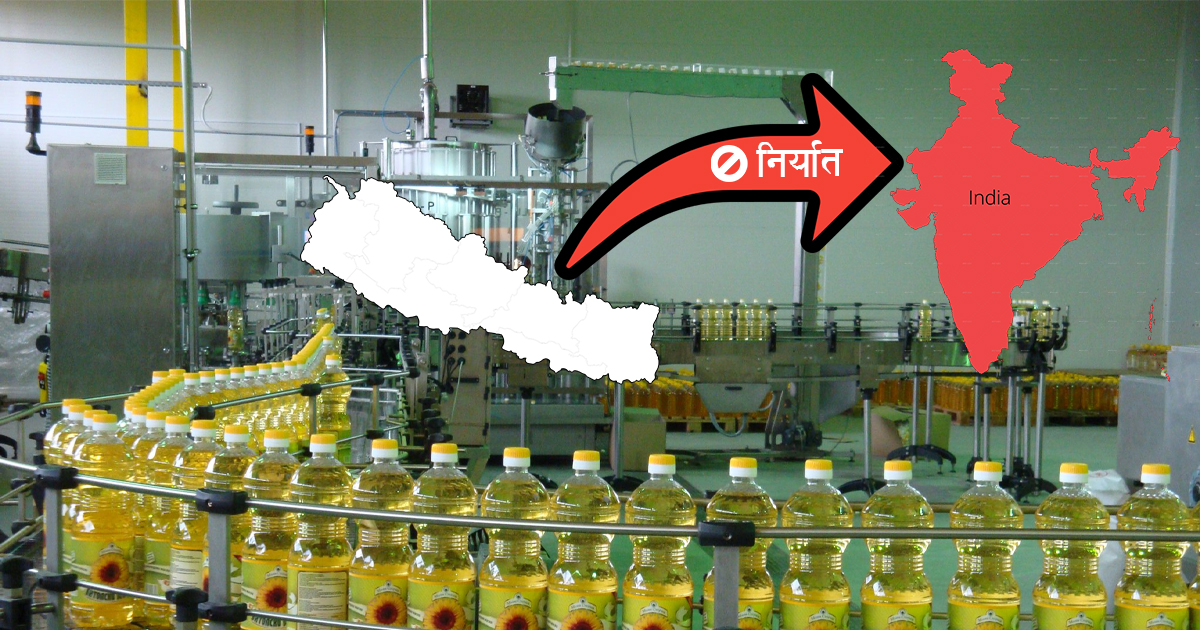Biratnagar: Nepal’s refined oil industry, which has long relied on exports to India, has been adversely affected after India reduced customs duties on the import of crude palm oil to protect its domestic industry.
Refined oil producers have been importing crude palm oil from Malaysia and Indonesia by paying 10 percent customs duty and 13 percent VAT, refining it locally, and exporting the finished product to India under the South Asian Free Trade Agreement (SAFTA).
Previously, Indian industries had to pay 27 percent customs duty when importing crude palm oil from Malaysia and Indonesia. However, Nepali refined oil producers are now under pressure with India’s Central Board of Indirect Taxes and Customs under the Ministry of Finance reducing the customs duty on crude palm oil to just 17 percent effective from 31 May 2025.
When India was charging 27 percent customs duty, 27 Nepali refinery industries importing crude palm oil at 10 percent duty could still profitably export refined oil to India. With India now charging only 17 percent duty, Nepali industries have started reducing production.
“Earlier, when crude palm imports faced 10 percent duty in Nepal and 27 percent in India, our products could yield up to 6–7 percent profit after all expenses,” said a Nepali industrialist. “Now that profit has dropped by 10 percent, essentially to zero after deducting all costs, so there’s no option but to reduce production.” According to him, domestic consumption of refined oil in Nepal is less than 10 percent.
Among refined oils, soybean and sunflower oils are the major export items from Nepal. In the first 10 months of the current fiscal year, Nepal exported soybean oil worth Rs 78.75 billion and sunflower oil worth Rs 10.09 billion. Of this, Rs 28.61 billion worth of refined oil was exported to India through the Biratnagar customs point alone in 11 months.
There is high demand for refined palm, soybean, and sunflower oils from Nepal in India’s bordering states like Bihar, West Bengal, and Uttar Pradesh.
Previously, India had kept customs duties high on crude palm imports to protect its farmers. However, recent reductions in soybean seed production by about 500,000 tonnes in India have impacted its oil-producing industries. In response, the Indian government has cut customs duty on crude palm oil by 10 percent to boost domestic production, according to Indian media reports.
India had produced 12.4 million tonnes of soybean seed last year, while this year, the production is expected to fall to 11.9 million tonnes. With annual soybean oil production in India normally at 2.3 million tonnes, the recent drop of 600,000 tonnes has reduced soybean and sunflower oil imports by 6.5 percent, prompting India to encourage local production by reducing duties on crude palm oil.
There are eight refined oil industries in Koshi Province alone, and India is their main market.
Nandkishor Rathi, Chair of the Morang Industrial Organization and director of Bagmati Oil Industries, said, “After India slashed customs duty on crude palm oil, it’s been difficult for Nepali industries to compete with Indian producers who can refine at a lower cost.”
According to him, due to higher production and transportation costs, Nepali products are now becoming more expensive than Indian ones, risking loss of market share.
Industries argue that the Nepali government needs to negotiate special export-friendly provisions with India to secure market access. Without such facilities, they say Nepali industries will always face crises.
Amit Sharada, director of Pashupati Edible Oil and secretary of the Morang Trade and Industry Association, noted that after India reduced tariffs, many Nepali refined oil industries have already cut production by nearly half.
Nepali refined oil industries have been exporting refined palm, soybean, and sunflower oils under the duty- and quota-free provisions of SAFTA. These industries import crude palm oil through Letters of Credit (LCs) and then process it into refined oil for export.



Comment Here